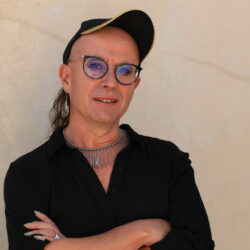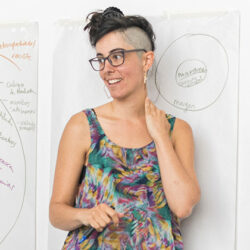Tools for effective and sustainable activism
This workshop offers a range of tools, collective and personal, which can make our activism more effective and sustainable. These methods can help us avoid burnout and stay in it for the long haul, adding continuity to our movement building. They can be used to ensure the collective and organisational dimensions of our activism exemplify the values we’re struggling for. A ‘regenerative’ approach goes beyond sustainability to explore how we can organise in ways that actually renew or revitalize our own resources and those of our groups – this can help us stay inspired, nourished, & more creative in our tactical approach.
This workshop offers a range of tools, collective and personal, which can make our activism more effective and sustainable. These methods can help us avoid burnout and stay in it for the long haul, adding continuity to our movement building. They can be used to ensure the collective and organisational dimensions of our activism exemplify the values we’re struggling for. A ‘regenerative’ approach goes beyond sustainability to explore how we can organise in ways that actually renew or revitalize our own resources and those of our groups – this can help us stay inspired, nourished, & more creative in our tactical approach.
Those of us involved in social change face enormous challenges. Daily we meet injustice, loss, and suffering in the world around us. We also meet our own responses, our fears, frustrations and anger. How can we best work with these responses creatively to achieve our goals? Where can we find the personal resources and skills that could make our action more effective and sustainable? And what collective tools can we use to enable our groups, organisations, and networks to better embody our values?
We use the term ‘regenerative’ because we don’t want things to just be sustainable. As in the world of permaculture, we want systems to regenerate through processes that restore, renew or revitalize their own sources of energy and materials. Our organising and activism can be a context within which we can thrive, where we create a shared context that enables us to flourish as we support others to do so. Our organising can embody a life-affirming vision and exemplify the values of social justice that we are inspired to realise in the world.
The course explores these issues using holistic and participatory methods – drawing on popular education, ecological and systems thinking, as well as reflective practices. It will bring together activists from across Europe, to share practice and strengthen networks.
What are the aims of the course?
• To explore methods of working effectively with the personal and inner dimension of activism, helping us take better care of ourselves, equipping us to avoid burnout and to better empower ourselves for action.
• To offer tools which support more skilful inter-personal work in our groups and networks , and enable ways of organising which exemplify the values we want to realise in the world .
• To create a vibrant and supportive temporary community of activists, as a safe space for deep reflection, analysis, and the sharing of experience of the personal and inter-personal dimensions of our work – finding nourishment and inspiration from each other and nature.
So, the workshop will help participants to:
1.1 Gain an increased awareness of the importance of self-care, and be better equipped to incorporate it in your life.
1.2 Learn ways of developing greater personal balance, clarity, inspiration, and resilience – including the use of reflective and contemplative practices.
1.3 Explore issues and techniques relevant to managing your energy, fears, frustrations, despair, and despondency – and become better able to avoid emotional hardening and cynicism.
2.1 Increase your understanding of group-work skills, including communication skills and ways of working with conflict, to transform energy depleting situations.
2.2 Gain experience of methods of organising and community building that can express the values we are working for and increase personal and group capacity.
2.3 Examine issues around empowerment, leadership, understanding power dynamics and collective processes.
3.1 Reflect deeply on your own personal history of activism, identifying patterns and tendencies, and find ways of skilfully transforming these where needed.
3.2 Identify and drawn upon the sources of nourishment and inspiration that support your engagement and help you realise your potential as an organiser and empowered agent for social change.
Who is it aimed at?
Anyone involved in socially engaged action addressing ecological, political and social justice issues. We embrace a broad definition of activism, including: Resistance – action preventing further damage to ecosystems and social justice; Renewal – action focused on developing and creating alternatives for healthier societies and communities; and Building Resilience – action supporting increased resilience in communities to weather the uncertain times ahead.
This course grows out of our experience of running the Sustaining Resistance course on sustainable activism since 2010.
In the solidarity economy:
(See details of our approach to radical economics here)
Contact us
to apply

Location:
Jay (formerly John) Jordan (they/them) is labelled a “Domestic Extremist” by the police, and “a magician of rebellion” by the press. Part-time author, sex worker and full time trouble maker, Jay is a lover of edges, especially between art and activism. They Co-founded Reclaim the street and the clown army, have choreographed carnivalesque riots, written a BBC radio play , facilitated community rituals, always applying joy and creativity to resistance. Education has always been central to their work, they deserted the academy in 2004 to apply pedagogy to social movements. Jay co facilitates the Laboratory of Insurrectionary Imagination based on the ZAD of Notre-Dame-des-Landes, where creative direct action stopped a destructive airport project.

Location:
Neus has been passionate about education since she was 8 years old and went dumpster diving in teachers’ recycling bins for worksheets to help other students learn at break-time. They moved from Castellon to Scotland to study Community Education, with a focus on youth work and adult education, where she co-founded The New Leaf Co-op, a successful workers’ co-op in Edinburgh. Whilst there Neus developed their understanding of how productivity meets good working conditions meets overturning the food system meets resourcing the commons with resilient and democratically managed capital. These passions now underpin her multiple roles at Ulex; from team culture and coordination to training and writing funding applications.

Location:
An Maeyens (she/her) is a facilitator and trainer with over two decades of experience in grassroots movements. She specialises in creative, inclusive agenda design and brings deep expertise on group culture, power dynamics, and transformative learning. Starting of in the anti-globalisation movement she has trained thousands in civil disobedience, supported international coalitions, and developed multilingual training programmes and toolkits. Her work spans movements, cultures, and countries, guided by a commitment to care, accessibility, and leaderful organising.

Location:
Ari’s activism began in 2002, at age 16, as a Bosnian refugee in Canada, where they founded and coordinated a group for LGBTIQ high school students and allies. They were a co-founder and leader at kolekTIRV in Croatia and Trans Network Balkan, involved in community organizing, advocacy, program management, team coordination, capacity building, education, media work, campaigns, events, fundraising, etc. In 2024, they joined the Supervisory Board of the Croatian Trade Union Collective of United Precarious Workers and Activists (SKUPA).
Beyond the Balkan region, Ari served as a Board member at Transgender Europe (TGEU), where they held roles as Secretary, Treasurer, and later Co-chair. They have also been a trainer with the Center for Artistic Activism and served on the Advisory Committee and since 2022 as a Community Care Facilitator at FRIDA — The Young Feminist Fund. Since 2024 they are the Operations Manager at Global Philanthropy Project.

Location:
Sergio (all pronouns) was born in Romania and migrated to Germany in the early 2010s. In the past, he was a social worker with homeless people and a social consultant for Eastern European migrants for various organisations. Trained as a filmmaker, he spent two years making a documentary about the ‘civic reawakening’ in Romania and the waves of protest it brought with it. In connection to this, Sergio is currently co-steering the development of an online open-source participative knowledge production platform on activism in Romania. Over the past nine years, Sergiu has offered his skills to various journalists, grassroots collectives and campaigns, mostly working within the labour rights, climate justice, international solidarity and anti-authoritarian movements in Germany and Romania. Nonetheless, his biggest focus since 2020 has been his work as an organiser with the anarcho-syndicalist Free Workers Union, where he focuses mostly on organising Romanian migrant workers on construction sites, in factories and in the agricultural field.

Location:
Linzy Na Nakorn is a movement director, politicised somatics practitioner, community organiser and facilitator. For the past decade she has been facilitating movement, body work and creating theatre, dance and participatory performance that advocates for and organises with communities in pursuit of housing, disability and racial justice. Her movement practice focuses on trauma-informed approaches to building resilience, capacity and joy via way of the body for personal, interpersonal and community sustainability. Linzy was a Co-Director of The Big Ride for Palestine in partnership with The Gaza Sunbirds, Native Woman Ride and Middle East Children’s Alliance; using cycling as a tool for mobilising active solidarity and in support of campaigning for the rights and self-determination of the Palestinian people. Linzy is part of a UK network of activists and artists advocating for Radical Care – supporting organisations, researchers and institutions to work towards system change in societal approaches to labour, leadership and access.

Location:
Jeroen (he/him pronouns) has been involved in grassroots social movements for more than two decades now, starting back when he was fifteen. Throughout the years the fights for “climate justice” and “migrant justice” have been consistently on top of the list of struggles that make his heart beat faster. A key transformative moment for Jeroen was reading Paulo Freire’s Pedagogy of the Oppressed. Freire’s revolutionary pedagogy gave him a language to support the creation of emancipatory learning environments, rooted in a desire for collective liberation. Jeroen has also been exploring in depth Boal’s Theatre of the Oppressed and Joanna Macy’s The Work That Reconnects among other methodologies to build his trainer’s toolkit. Inspired by the liberatory possibilities of these traditions, he started an organization with a friend, LABO vzw, based in Belgium, where he has worked as a trainer and campaigner between 2013 and 2023.

Location:
Ella brings more than 10 years’ external experience working with not for profit and community based organisations across diverse themes including: advocacy for migrant communities; local community engagement in national policy making; and structural relationships between poverty and disenfranchisement, and education and poverty. Immersed in critical theory in her early 20s she brings a holistic and questioning approach, and is passionate about systemic solutions that centre relationship and interconnection between ecology and society. A long standing member of the collective, Ella has been part of the core team since the inception of the Ulex Project. Her work bridges facilitation, developing project partnerships, governance, strategy, operations, and project and programme evaluation. She has developed and overseen more than 70 partnerships with a range of different actors across European social movements.
Ulex: Latin (argelaga Catalan, gorse English) noun:
1. A thorny-evergreen flowering shrub, with a high capacity for regeneration and resilience. Its seedpods open in contact with fire and it reshoots from charred stumps. A successionary plant that grows well under challenging conditions. It improves soil fertility through nitrogen fixing, preparing the way for renewed biodiversity.
2. A traditional choice for igniting fires. Burns hot and bright.
3. A networked project adding nutrition and fertility to European social movements through training and capacity building. It kindles the realisation of social justice, ecological intelligence, and cognitive vitality.